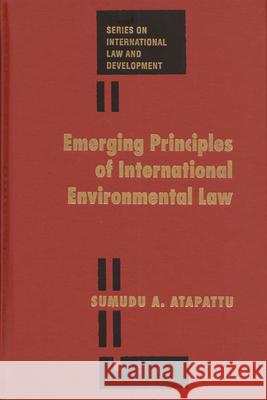Emerging Principles of International Environmental Law » książka
Emerging Principles of International Environmental Law
ISBN-13: 9781571051820 / Angielski / Twarda / 2007 / 350 str.
Emerging Principles of International Environmental Law is ideally suited for any law or environmental studies student, practitioner or law academic who is interested in the legal status of emerging principles in the field of international environmental law. Among its highlights, the text examines the interaction of principles/concepts such as sustainable development, the precautionary principle etc., with one another and how the present international environmental law regime has taken the vast disparity between developed and developing countries into account in designing innovative methods to accommodate this disparity. Following an introductory chapter on the development of international environmental law, the book explores five concepts/principles that have emerged in the recent years in this field and discusses their relationship to one another, particularly how they interact and contribute to the achievement of sustainable development: sustainable development, the precautionary principle, the environmental impact assessment process and participatory rights, the common but differentiated responsibility principle and the polluter pays principle. The final chapter evaluates the emergence of a distinct field of international law called 'International Sustainable Development Law' and discusses its future direction. While these principles or concepts have received much attention in previous literature, not much attention has been paid to their interaction with one another and how the present international environmental law regime has taken the vast disparity between developed and developing countries into account in designing innovative methods to accommodate this disparity. It is here the strength of the book lies. The book was written to provide a firm grasp of international environmental law issues and of international law in general. It is intended for the international market, for anybody who is interested in the future direction of international environmental law and of sustainable development. As such, it would be relevant not only to the law student and law academic, but also to international organizations such as UNEP, Commission on Sustainable Development, UNDP and the World Bank as well as for international and national civil society groups engaged in environmental issues and human rights issues. Published under the Transnational Publishers imprint.











